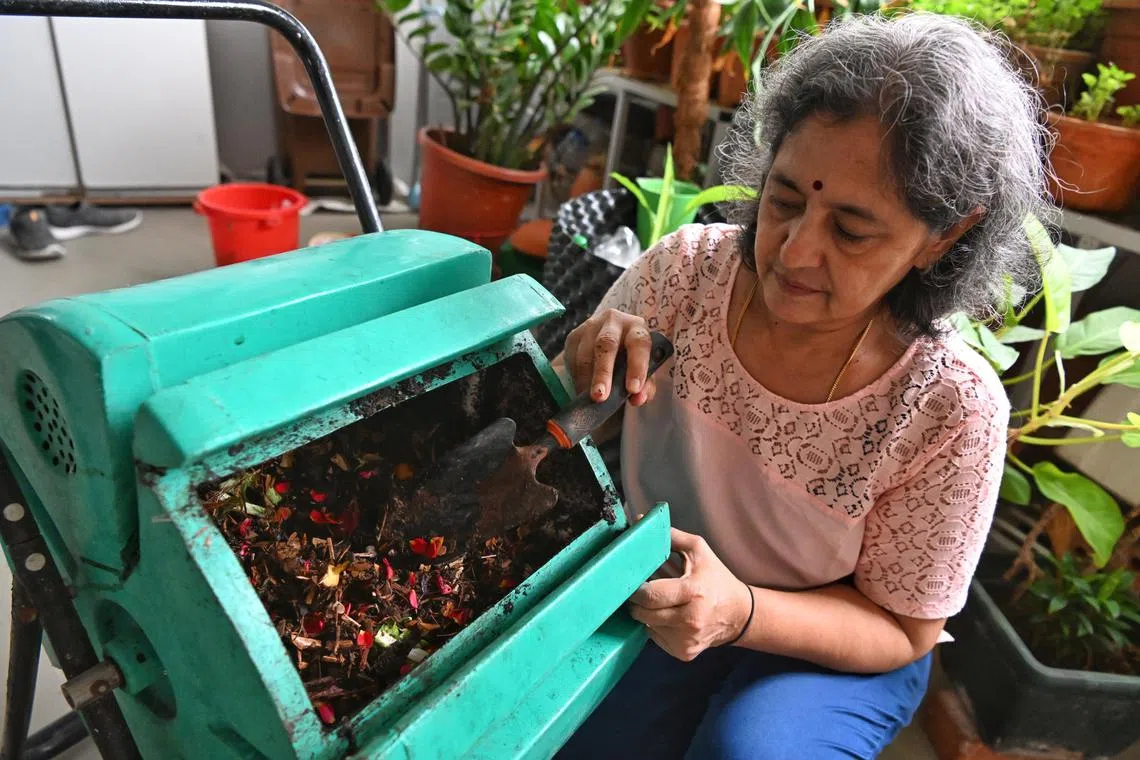Teacher contacts parents to get them to adopt green practices at home with their kids
Sign up now: Get ST's newsletters delivered to your inbox

Mrs Padmarani Srivatsan, 59, throwing trash into folded newspaper that was used to line the bin.
ST PHOTO: CHONG JUN LIANG
SINGAPORE – The newly implemented plastic bag charge
Her paper bin liner can be folded from newspaper into a bag-like shape within a minute. She uses the liners for dry rubbish and reuses plastics like food packaging for wet waste to avoid spillage and pests in the rubbish chute.
The kindergarten teacher encourages her students to segregate waste into recyclables, wet and dry waste.
On folding newspaper bin liners, she said: “It’s like origami, it’s a form of therapy for kids.”
This method saved multiple plastic bags in eight classrooms in her school, where cleaners previously changed plastic bin liners daily.
Segregating rubbish for composting or recycling is also important to Mrs Srivatsan.
At home, vegetable scraps are composted and used in her Housing Board corridor garden of sage, basil and ornamental plants.
“I’m so proud and happy that for the past 15 years, my kitchen waste has not gone to the trash,” said the 59-year-old mother of two.
She diligently maintains her compost by aerating the bin weekly, ensuring the dry and wet ratio is balanced, and adding yoghurt that contains bacteria necessary for decomposition.
Both her bins in the common HDB corridor do not produce smells that often come with decaying matter.
Besides the Global Indian International School in Punggol where she teaches, Mrs Srivatsan also provides composting know-how in workshops, and advocates with Plastic-Lite SG to engage shoppers and urge them to use plastic bags less often.
Before living in Singapore for the last 15 years, she learnt the value of conserving resources as a child when she helped her father on his farm in India.
“I knew the hardship of what it takes to grow food, not everyone does. I have personal experience so I know that it’s not easy. Those values were inculcated in me without my parents telling me,” Mrs Srivatsan said.
“It’s not individual effort,” she added, about efforts to raise environmental awareness and make a difference in Singapore. She believes that both community and family can influence the individual towards creating a greener country.
“Individual families have to take it up as an onus on them to inculcate those values in their family.”

Mrs Padmarani Srivatsan folded newspapers to line the bin instead of plastic bag.
ST PHOTO: CHONG JUN LIANG
She encourages the conservation of resources at home. She goes beyond, contacting parents to encourage them to maintain good practices with their children, like turning appliances off when they leave a room.
She believes that the easy accessibility of daily resources may cause wasteful habits. However, she hopes community efforts and good family values can counter this.

Segregating rubbish for composting or recycling is also important to Mrs Padmarani Srivatsan.
ST PHOTO: CHONG JUN LIANG
Mrs Srivatsan said the recent plastic bag charge should have been implemented years ago.
“You should not even give a five-cent bag. For some people, five cents are nothing.”
Instead, she suggested a solution to completely remove plastic bags, replacing them with $2 reusable bags. This would prompt residents to consider buying one for multiple reuse.
“I think if you love your children, if you love your future generation, we will do it,” said Mrs Srivatsan, referring to green practices to reduce global warming.


